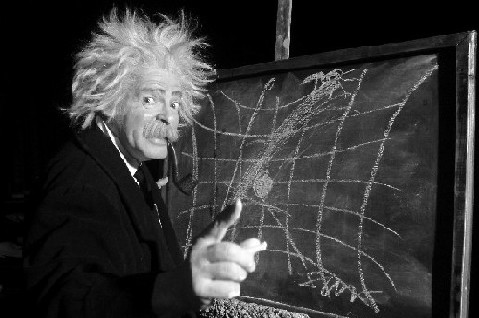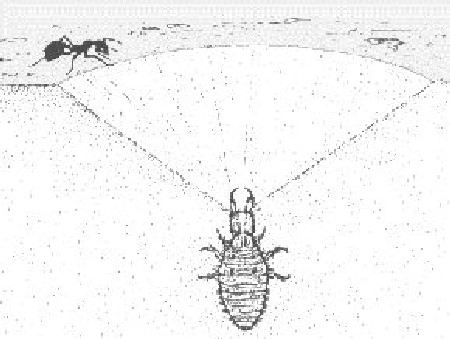For
the past four years, I have been commissioned by Cape
Town's MTN
SCienCentre www.mtnsciencentre.org.za to script and stage
a work of theatre
covering a topic of scientific and educational interest.
So far I have four
under my belt: three are one-man plays and the first i
Klips! was performed
by one male white actor who played the sun and one black
actress who played
the moon. This play commemorated our near total solar
eclipse on 4th
December 2002. It was about African myths and legends
of the moon in the
sun.
The
others are Ta Ta Ma Genes a fifty minute one-man show
on biotechnology
which takes a non-prescriptive look at amongst other,
cloning, genetic
engineering and the history of the subject; this play
linked in with the
50th anniversary of James Watson's and Francis Crick's
discovery of the
structure of DNA; and, last year I wrote a short one called,
Eureka!
Inventions that change the world to coincide with the
ScienCentre's of
South African Inventions Exhibition.
Currently
and something I did on April 15th is the ScienCentre's
play
Imagining Einstein a 60 minute show about the man his
work and the science
that surrounded him. I am touring it around our country
with the aim of
reaching our youth. Should the funds be forthcoming I
will take it to
Bibliotheca Alexandrina, in Egypt for their Einstein Symposium
in June.
Sadly I have just heard that these funds are not available.

Here
I am as Albert Einstein.
So
far, the play has received wonderful comments from adults
and youngsters alike:
"Factually
amazing, scientifical inspiration at its best. Very thought
provoking." - Anthony and Ansa Faull - Council for
Geoscience
"Wunderbar,
to see a play in South Africa of rich insight." -
Gargen Roman (?)
"As
a German that comes out of this era and an admirer of
Albert Einstein
emotions were brought back I didn't know still existed.
Thanks for a
wonderful show." - Erwin Gehring
"Much
food for thought, great concept and presentation."
– Michael Cunningham
"Brilliant!
Gives me lots of ideas to take home to Kenya." -
mmwingi@yahoo.co.uk
"Thought-provoking;
makes one consider ones own teaching methods. Absolute
must for all science teachers." - Weedaad Nasiep
"Complex
and Flawless performance." - Angus
"Very
interesting and important to capture the scientific imagination
of the
young ones, and who knows there might be more curious
minds." - Laura Bishop
We
are currently producing a short movie about this IYP which
will include a junior school orchestra and choir as well
as a ditty about Albert Einstein and his papers of 1905.
I have always had fun at school, although there were times
that I just lived without analyzing what or why I was
doing what I was doing. This resulted in being fairly
naughty and I was sent to a boarding school during my
final two years. The irony is that I didn't excel in science
and mathematics. In fact because the school was situated
in fruit farm territory I spent more time trying to find
ways of picking delicious peaches, apples and bunches
of grapes without getting caught rather than understanding
why the sum of two angles of a triangle is equal to the
external angle of the opposite internal angle. However
due to a rather authoritarian method I managed to pass
my final exams. During my school career I took biology
as a subject but only got 11 per cent for the exams and
yet I found myself writing and performing in a play about
biotechnology. Today I know more about the subject than
most of my peers.
What
we learn at school may not be what we put into practise during
our adult life. I also discovered that that which we don't like
- I really didn't get a kick out of biology at school - very
often turns out to be what we end up applying to our everyday
life as we get older. A desire to possess something too much
may result in it leaving you, whereas hating it too much may
result in it following you, haunting you till one finally one
gives in and allows it to be as I did with biology.
What
I did and studied at school is not what I am doing now.
Sometimes I see school as a big big baby-sitting place where
children go so that you and I can get on and write to one
another or do what we do for science and art. How can my/your/his/her
child receive quality education when they are grouped with
30 children? Robin, my six year old, spends five hours at
school per day. That's 300 minutes, but its divided among
30 children. Ten minutes! Ten Minutes is all he gets of
individual attention.
So
my belief is that school is where he learns patience, tolerance,
caring and a little love. Here at home his parents ingrain
the love of reading, of music and of imagination. Wouldn't
it be great if we all spent less time trying to make lots
of money so that we can travel the world and more time educating
our children?
There
is so much around our neighbourhood. We are overwhelmed
with information. Fact is, we don't even need a radio let
alone television to learn how an anteater survives in our
back garden under the tomato plant. Look at the science,
the maths in the technique of capturing the ant as it falls
down the slope into the pinchers of the anteater insect.

Speaking
of ants, here above is a recent sketch ...
|